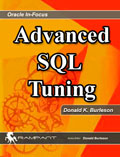 |
|
Oracle alert log error
e-mail
Oracle Database Tips by Donald Burleson |
Its
important to monitor the Oracle alert log and send alerts when
serious errors are logged into the alert log. Also note
that you must manage
multiple alert
logs in RAC.
It can take weeks to
write a comprehensive set of intelligent scripts to scan the
alert logs for important massages.
If you don't want to write your own custom scripts, see my
Oracle script download.
There are
many approaches to detecting alert log messages and sending
e-mail alerts:
-
Ion for Oracle - The Ion tool has complete mechanisms for setting
custom alert log extracts.
- Scripts -
Write OS shell scripts to detect alert log messages.
-
PL/SQL
- You can write a SQL*Plus procedure using
utl_file to read the alert log.
- In 11g and beyond, you can directly query the alert log
with SQL, using
x$dbgalertext.
Also see these notes on reading the alert
log file and sending alert messages:
Also see my notes on using the
dbms_server_alert package.
Sample alert log monitoring scripts
Laurent Baylac has this example script to use utl_file to
scan for alert log messages:
set head on
set echo off
set verify off
set feedback off
set pagesize 5000
set tab off
rem ---
rem alerts.sql
rem
rem Comments: Show errors in alert.log from the last n hours.
rem It works for both UNIX and Windows databases.
rem For Oracle 7.3 and higher.
rem Check the format of the alert log file before.
rem
rem Required: * utl_file_dir must contain background_dump_dest
rem * background_dump_dest parameter must be a complete directory
rem name, in the form '?/rdbms/log' or '%RDBMS73%' etc
rem
rem ---
set serverout on
exec dbms_output.enable( 1000000)
DECLARE
v_sid v$database.name%TYPE; /* database */
v_bdumpdest v$parameter.value%TYPE; /* directory of alert.log */
v_count NUMBER;
v_alertname VARCHAR2( 19); /* name of the alert.log */
v_file_handle utl_file.file_type; /* handle tp alert.log */
v_eof BOOLEAN := FALSE;
v_text VARCHAR2( 2000);
v_date_try DATE; /* Help var. for date line in de alert.log */
v_date DATE; /* Keep de date line from alert.log */
v_date_is_new BOOLEAN; /* Datum to be displayed */
v_interesting BOOLEAN := FALSE; /* Relevant content from the alert.log */
c_aantal_uren NUMBER := &1; /* Total hours from the time the contents have to be displayed */
FUNCTION file_does_exist
( location_in IN VARCHAR2
, filename_in IN VARCHAR2
)
RETURN BOOLEAN AS
v_file_handle utl_file.file_type;
BEGIN
v_file_handle := utl_file.fopen
( location => location_in
, filename => filename_in
, open_mode => 'R'
);
utl_file.fclose( file => v_file_handle);
RETURN TRUE;
EXCEPTION
WHEN OTHERS THEN
RETURN FALSE;
END file_does_exist;
BEGIN
SELECT name
INTO v_sid
FROM v$database
;
SELECT value
INTO v_bdumpdest
FROM v$parameter
WHERE name = 'background_dump_dest'
;
SELECT COUNT(*)
INTO v_count
FROM v$version
WHERE banner LIKE '%Windows%'
;
IF v_count = 0 THEN
/*
|| This is not a Windows machine. The name of the alert log is alert_SID.log
|| sometimes alert_sid.log
*/
IF file_does_exist
( location_in => v_bdumpdest
, filename_in => 'alert_' || v_sid || '.log'
)
THEN
v_alertname := 'alert_' || v_sid || '.log';
ELSE
v_alertname := 'alert_' || LOWER( v_sid) || '.log';
END IF;
ELSE
/* Windows machine */ v_alertname := v_sid || 'ALRT.LOG';
END IF;
BEGIN
v_file_handle := utl_file.fopen
( location => v_bdumpdest
, filename => v_alertname
, open_mode => 'R'
);
EXCEPTION
WHEN utl_file.invalid_mode THEN
RAISE_APPLICATION_ERROR
( -20001, 'the open_mode string was invalid')
END;
WHILE NOT v_eof
LOOP
BEGIN
utl_file.get_line
( file => v_file_handle
, buffer => v_text
);
EXCEPTION
WHEN NO_DATA_FOUND THEN
v_eof := TRUE;
WHEN value_error THEN
utl_file.fclose_all;
RAISE_APPLICATION_ERROR
( -20001, 'line too long to store in buffer');
WHEN utl_file.invalid_operation THEN
utl_file.fclose_all;
RAISE_APPLICATION_ERROR
( -20001, 'file is not open for reading');
WHEN utl_file.read_error THEN
utl_file.fclose_all;
RAISE_APPLICATION_ERROR
( -20001, 'OS error occurred during read');
END;
IF v_interesting THEN
IF SUBSTR( v_text, 4, 1) = '-' /* 'ORA-..., PLS-..., etc. */
THEN
IF v_date_is_new THEN
dbms_output.put_line( CHR( 10));
dbms_output.put_line
( INITCAP( TO_CHAR( v_date, 'DY MON DD HH24:MI:SS YYYY')));
END IF;
v_date_is_new := FALSE;
dbms_output.put_line( SUBSTR( v_text, 1, 80));
END IF;
END IF;
BEGIN
v_date_try := TO_DATE( v_text, 'DY MON DD HH24:MI:SS YYYY');
IF v_date != v_date_try OR v_date IS NULL
THEN
v_date := v_date_try;
v_date_is_new := TRUE;
IF v_date > SYSDATE - ( c_aantal_uren / 24) THEN
v_interesting := TRUE;
END IF;
ELSE
v_date_is_new := FALSE;
END IF;
EXCEPTION
WHEN OTHERS THEN
NULL; /* There is no date. The file is read further. */
END;
END LOOP;
utl_file.fclose( file => v_file_handle);
EXCEPTION
WHEN utl_file.invalid_path THEN
dbms_output.put_line
( 'alerts.sql: utl_file.invalid_path encountered. ' ||
'Check utl_file_dir.'
);
WHEN utl_file.invalid_operation THEN
IF v_bdumpdest LIKE '%$%'
OR v_bdumpdest LIKE '%?%'
OR v_bdumpdest LIKE '%\%%' ESCAPE '\'
THEN
dbms_output.put_line
( 'alerts.sql: Unable to read alert.log because ' ||
'of background_dump_dest parameter ' ||
v_bdumpdest || '.'
);
ELSE
dbms_output.put_line
( 'alerts.sql: utl_file.invalid_operation encountered.');
END IF;
END;
/
 |
|
Get the Complete
Oracle SQL Tuning Information
The landmark book
"Advanced Oracle
SQL Tuning The Definitive Reference" is
filled with valuable information on Oracle SQL Tuning.
This book includes scripts and tools to hypercharge Oracle 11g
performance and you can
buy it
for 30% off directly from the publisher.
|
